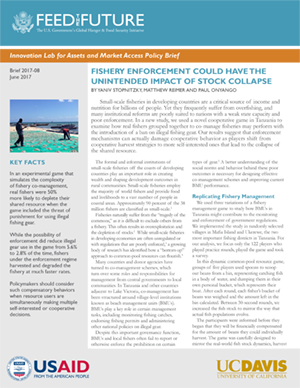
Small-scale fisheries in developing countries are a critical source of income and nutrition for billions of people. Yet they frequently suffer from overfishing, and many institutional reforms are poorly suited to nations with a weak state capacity and poor enforcement.
In a new study, we used a novel cooperative game in Tanzania to examine how real fishers grouped together to co-manage fisheries may perform with the introduction of a ban on illegal fishing gear. Our results suggest that enforcement mechanisms can actually damage cooperative behavior as players shift from cooperative harvest strategies to more self-interested ones that lead to the collapse of the shared resource.
Key Facts
- In an experimental game that simulates the complexity of fishery co-management, real fishers were 50% more likely to deplete their shared resource when the game included the threat of punishment for using illegal fishing gear.
- While the possibility of enforcement did reduce illegal gear use in the game from 5.6% to 2.8% of the time, fishers under the enforcement regime harvested and degraded the fishery at much faster rates.
- Policymakers should consider such compensatory behaviors when resource users are simultaneously making multiple self-interested or cooperative decisions.
 The formal and informal institutions of small-scale fisheries off the coasts of developing countries play an important role in creating wealth and shaping development outcomes in rural communities. Small-scale fisheries employ the majority of world fishers and provide food and livelihoods to a vast number of people in coastal areas. Approximately 90 percent of the 38 million fishers are classified as small-scale.[1]
The formal and informal institutions of small-scale fisheries off the coasts of developing countries play an important role in creating wealth and shaping development outcomes in rural communities. Small-scale fisheries employ the majority of world fishers and provide food and livelihoods to a vast number of people in coastal areas. Approximately 90 percent of the 38 million fishers are classified as small-scale.[1]
Fisheries naturally suffer from the “tragedy of the commons,” as it is difficult to exclude others from a fishery. This often results in overexploitation and the depletion of stocks.[2] While small-scale fisheries in developing economies are often unregulated or with regulations that are poorly enforced,[3] a growing body of research has identified how a “bottom-up” approach to common-pool resources can flourish.[4]
Many countries and donor agencies have turned to co-management schemes, which turn over some roles and responsibilities for management from central governments to local communities. In Tanzania and other countries adjacent to Lake Victoria, co-management has been structured around village-level institutions known as beach management units (BMUs). BMUs play a key role in certain management tasks, including monitoring fishing catches, endorsing fishing permits and administering other national policies on illegal gear.
Despite this important governance function, BMUs and local fishers often fail to report or otherwise enforce the prohibition on certain types of gear.[5] A better understanding of the social norms and behavior behind these poor outcomes is necessary for designing effective co-management schemes and improving current BMU performance.
Replicating Fishery Management
We used three variations of a fishery management game to study how BMUs in Tanzania might contribute to the monitoring and enforcement of government regulations. We implemented the study in randomly selected villages in Mafia Island and Ukerewe, the two most important fishing districts in Tanzania. For our analysis, we focus only the 122 players who played practice rounds, played the game and took a survey.
In this dynamic common-pool resource game, groups of five players used spoons to scoop out beans from a bin, representing catching fish in a body of water, and dumping them in their own personal bucket, which represents their boat. After each round, each fisher’s bucket of beans was weighed and the amount left in the bin calculated. Between 30-second rounds, we increased the fish stock to mirror the way that actual fish populations evolve.
The participants were informed before they began that they will be financially compensated for the amount of beans they could individually harvest. The game was carefully designed to mirror the real-world fish stock dynamics, harvest strategies and opportunities to engage in illegal behavior.
Three variations of this game allowed us to study fisher behavior under different institutional regimes. One version focused on harvest only, with no chance of illegal gear use and no enforcement. A second one (Illegal gear) included the opportunity to anonymously use illegal fishing gear, and the third variant (Enforcement) added random “patrols” and the opportunity for the group to punish any player who they suspected or who was caught.
Enforcement and Resource Collapse
Our results find that fishers in the Enforcement game harvest faster and are 50 percent more likely to destroy the fishery completely. These results suggest that enforcement mechanisms can sometimes damage cooperative behavior as players change behavior to take advantage of specific features of regulations.
In this case, this shift causes the common-pool resource to be depleted faster. Importantly, these outcomes under the Enforcement institution are not driven either by higher cheating, which was never more than eight percent in either arm of the experiment, nor by actual punishment, which happened only once in all groups across all villages. Instead, the possibility of enforcement induces individuals to harvest during each round at significantly higher rates.
This faster depletion can be seen by looking at harvests and fishery stocks in terms of first-round harvests, third round harvests (an inflection point in many groups’ behavior), and in the likelihood of complete resource exhaustion. This is an unintended consequence of the Enforcement institution, which was not predicted.
Increasing Cooperation for Co-management
These results suggest that policymakers should exhibit caution when resource users are simultaneously making multiple self-interested or cooperative decisions. Institutional reforms that target specific behaviors, such as the use of illegal fishing gear, may result in unintended consequences for both the group of resource users and for the resource itself. This finding could apply anywhere co-management systems play a role in managing shared resources.
When an enforcement mechanism was added to this game, players on average harvested the resource more aggressively as an unintended consequence. The possibility of punishment actually caused players to exploit the resource at a faster rate.
One explanation for our results is that players viewed early rounds of the Enforcement game as the time to take advantage of the common-pool resource for individual gain before the group’s experience, or the stock’s collapse, had a greater influence over their choices. Such outcomes could be explained, for example, by selfishness or by present-biased time preferences.
This result is also consistent with a subset of experimental literature on institutions that has recently focused on the “crowding out” hypothesis. Researchers studying biodiversity and ecosystem protection in 2013 argued that in cases of motivation crowding, external motivations, such as financial reward, may actually undermine intrinsic motivations, such as a desire to cooperate or responsibly manage a shared resource.[6]
The evidence from our experiment suggests that the threat of punishment during the Enforcement game variation may have crowded out cooperative strategies. By focusing the game on penalizing those who use illegal gear, it distracted players from sustaining the resource and they responded by increasing their harvest rates.
Yaniv Stopnitzky is an assistant professor of economics at the University of San Francisco.
Matthew Reimer is an assistant professor of economics at the University of Alaska, Anchorage.
Paul Onyango is a professor of aquatic sciences and fisheries at the University of Dar Es Salaam.
[1] Food and Agriculture Organization of the United Nations (FAO), 2008.
[2] Hardin, G. 1968. “The Tragedy of the Commons.” Science.
[3] FAO, 2008.
[4] Ostrom, E. 2000. “Collective Action and the Evolution of Social Norms.” Journal of Economic Perspectives.
[5] Nunan, Fiona et al. 2015. “Institutions and co-management in East African Inland and Malawi Fisheries: A critical perspective.” World Development.
[6] Rode, J. et al. 2013. “Economic incentives for biodiversity conservation: What is the evidence for motivation crowding?” Helmholtz-Zentrum fur Umweltforschung GmbH - UFZ.
This report is made possible by the generous support of the American people through the United States Agency for International Development (USAID). The contents are the responsibility of the Feed the Future Innovation Lab for Assets and Market Access at UC Davis and do not necessarily reflect the views of USAID or the United States Government.
